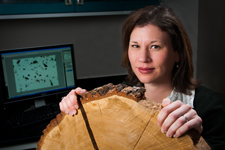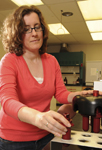SIX RESEARCHERS GET CAREER BOOST FROM NATIONAL SCIENCE FOUNDATION
When the news was announced K-State had not one, or two, but six faculty members whose research was recognized by the National Science Foundation, it was not only a cause for celebration, but an historic first for the university.
The Faculty Early Career Development Program, or CAREER, award is one of the nation's most prestigious honors directed toward young faculty in recognition of their high potential to become future leaders in their research areas.
"When talking with past winners of CAREER awards, I am always amazed at the profound impact that the award has had on their professional lives at K-State," said Jim Guikema, associate vice president for research.
Guikema said he hopes the same is true for the current six.
This year's winners are Christine Aikens, assistant professor of chemistry; Kendra McLauchlan, assistant professor of geography; Anna Whitfield, assistant professor of plant pathology; Jianhan Chen, assistant professor of biochemistry; Simon Ou, assistant professor of computing and information sciences; and Wenqiao "Wayne" Yuan, assistant professor of biological and agricultural engineering.
Combined, the researchers netted more than $3 million in funding.
 Aikens, right, will use $600,000 over the next four years to improve laboratory experiences for undergraduates by incorporating software that helps Chemistry I students visualize molecular geometries; host a yearly energy and sustainability workshop for middle school students; and research a potential clean renewable energy source.
Aikens, right, will use $600,000 over the next four years to improve laboratory experiences for undergraduates by incorporating software that helps Chemistry I students visualize molecular geometries; host a yearly energy and sustainability workshop for middle school students; and research a potential clean renewable energy source.
Aikens will look at photosystem II, a complex, naturally occurring protein that uses light to produce oxygen electrons and hydrogen ions from water. Her research group will analyze what it is about this protein's oxygen-evolving center that makes it an effective catalyst for water splitting. They will look for similar traits in synthetic materials.
 McLauchlan, left, received nearly $440,000 to study 10,000 years of nitrogen availability in forest and grassland ecosystems in an effort to understand how global change occurs today.
McLauchlan, left, received nearly $440,000 to study 10,000 years of nitrogen availability in forest and grassland ecosystems in an effort to understand how global change occurs today.
"This award will help us understand past ecosystems to provide context for modern changes to Earth systems," McLauchlan said.
 Whitfield, right, received $1 million for the next five years to research how the Maize mosaic virus affects insects that transfer the virus from plant to plant.
Whitfield, right, received $1 million for the next five years to research how the Maize mosaic virus affects insects that transfer the virus from plant to plant.
Although scientists have studied insect interaction with other pathogens for some time, relatively little work has been done on insect interaction with viruses, Whitfield said. She hopes the findings lead to prevention strategies in virus transmission from plant to plant by carrier insects.
"The idea behind my proposal is that most viruses, particularly plant viruses, are transmitted by insect vectors," Whitfield said.
 Chen, left, received more than $670,000 in funding over the next five years to study new methods for effective modeling of proteins in a class of proteins known as intrinsically disordered proteins.
Chen, left, received more than $670,000 in funding over the next five years to study new methods for effective modeling of proteins in a class of proteins known as intrinsically disordered proteins.
This type of protein plays fundamental roles in cellular function and is frequently involved in neurodegenerative diseases and cancer. Chen said this research can provide fundamental knowledge of the structure, interaction and control of intrinsically disordered proteins, and such knowledge will help assess and manage related human diseases.
 Ou, right, received about $430,000 to improve cybersecurity by providing automated reasoning that will help predict potential attacks or breaches in network security. Through K-State outreach programs, the test-bed infrastructure produced from the research will educate the general public about cybersecurity problems.
Ou, right, received about $430,000 to improve cybersecurity by providing automated reasoning that will help predict potential attacks or breaches in network security. Through K-State outreach programs, the test-bed infrastructure produced from the research will educate the general public about cybersecurity problems.
"Cybersecurity is an asymmetric warfare," Ou said. "The attackers only need to find one hole to compromise a system, but the defenders have to plug them all. Without automated reasoning, cyberspace will continue to be the Wild West, where bad guys wreak havoc."
 Yuan, left, received a five-year $400,000 grant to expand the understanding of algae oil production as a renewable energy source. Yuan's long-term goal is to make energy manufacturing from algae economically viable. His research focuses on identifying the best materials -- like sheet metal or polymers -- that oil-rich algae can be grown on for biofuel manufacturing in the ocean.
Yuan, left, received a five-year $400,000 grant to expand the understanding of algae oil production as a renewable energy source. Yuan's long-term goal is to make energy manufacturing from algae economically viable. His research focuses on identifying the best materials -- like sheet metal or polymers -- that oil-rich algae can be grown on for biofuel manufacturing in the ocean.
"The entire university is proud of these six scholars," Guikema said. "Winning the prestigious award is a remarkable accomplishment in these competitive times."